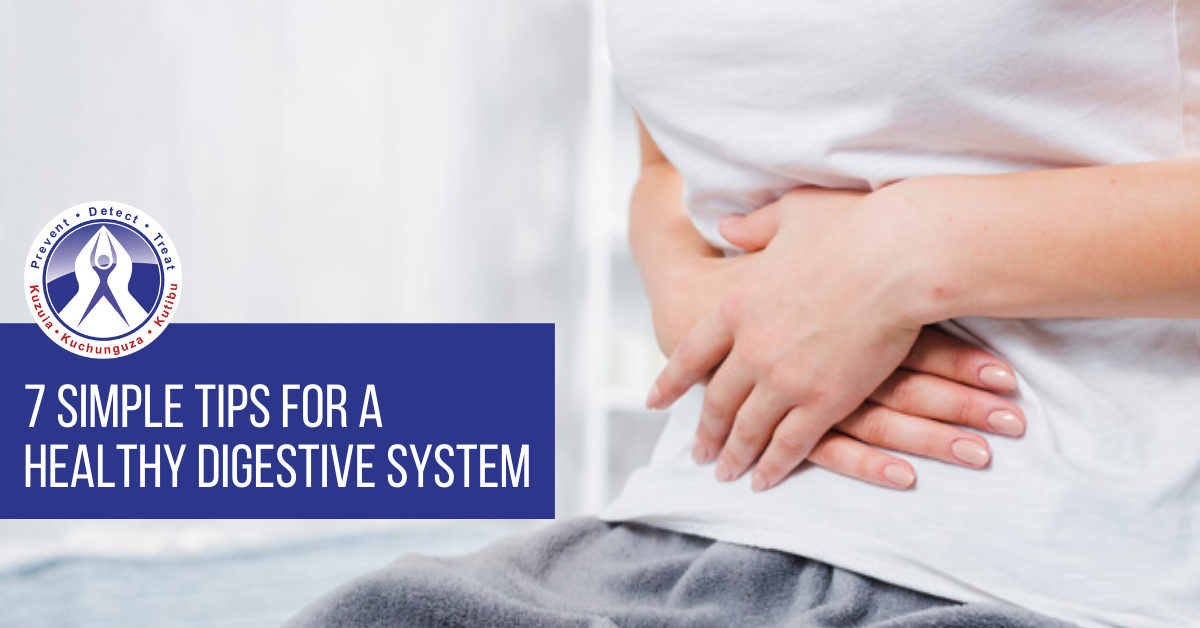7 Simple Tips For A Healthy Digestive System
1,204 viewsLeading a healthy and happy life is impossible without having a healthy digestive system. It is common to experience digestive problems like upset stomach, gas, acidity or constipation once in a while. However, if these symptoms occur frequently, it can have serious repercussions on your overall health.
Here are 7 simple health tips to improve your digestive system:
1. Eat Fibre-Rich Food

One of the easiest ways to improve digestion is to eat lots of fibre-rich foods. Fibre makes it easier for the food to keep moving through the digestive tract and hence, prevents constipation. It also promotes a healthy gut by removing more and more waste from the body.
However, you must keep in mind that both soluble and insoluble types of fibre are important for a healthy digestive system because they have different functions to perform. Your body cannot break down insoluble fibre so it adds bulkiness to the stool. On the other hand, soluble fibre absorbs the water content from your digestive system and prevents the stool from becoming too loose.
You can get soluble fibres from beans, citrus fruits, peas, barley and oats. Good sources of insoluble fibre include whole-wheat foods, root vegetables like potato and carrots, pulses, nuts and edible seeds.
2. Limit Intakes of Fatty Foods

Consuming fatty foods have an adverse effect on your digestive health. Fats in the food are harder to digest and stay in the digestive tract for the longest time, compared to any other type of food. Saturated and trans fats also raise the cholesterol levels in the body and may put you at risk of heart disease in the future.
However, it is necessary to consume a limited amount of unsaturated fat to aid the process of digestion. For instance, unsaturated fats help your body absorb vitamins better. They also combine with dietary fibre to smoothen bowel movement.
Thus, to keep your digestive system healthy, refrain from eating foods full of saturated and trans fats like junk food, cookies, and other greasy foods. On the other hand, make sure you consume 60 to 70 grams of unsaturated fats every day. Lean meat, fish, walnuts and plant oils like olive oil are good sources of unsaturated fats.
3. Chew Your Food Properly

Chewing food well is one of the most neglected tips for better digestive health. This may sound like the simplest tip to follow yet not many people focus on chewing food properly whenever they eat.
If you don’t chew your food thoroughly, your stomach has to work harder to covert the large solid food particles into liquid mixtures. The stomach needs saliva to form these fluid mixtures that can smoothly enter the intestines. When you chew the food more, you produce and send enough saliva to your stomach for digestion.
Moreover, the more you break down the food in your mouth itself, the easier it will be for the digestive enzymes to absorb nutrients from the food. Poor chewing leads to less absorption of essential nutrients.
Therefore, chewing your food thoroughly is the first step towards a smooth digestive process. It is absolutely necessary for a healthy stomach.
4. Incorporate Probiotics in Your Diet

The digestive system has many types of good and bad bacteria to keep the system functioning. Sometimes, there may be an imbalance in your gut when the number of bad bacteria exceeds the number of beneficial bacteria. This imbalance can be caused by an illness, poor diet or medications such as antibiotics. You may experience digestive disorders like diarrhoea or gas when there is such an imbalance in your gut.
To avoid these problems, it is advisable to consume probiotics at moderate levels. Probiotics are the good, beneficial bacteria that counter or prevent the increasing bad bacteria in your gut and improve your overall digestive health. Probiotics also help in breaking down certain kinds of fibre that are hard to digest and thus, prevent the bloating or pain caused by these fibres.
You can get sufficient probiotics from fermented foods and yogurts. Alternatively, you can consult a doctor and get a prescription for probiotic supplements that you can consume in the capsule form.
5. Eat at Short, Regular Intervals

Having your meals and snacks with regular intervals is essential to keep your digestive system in its best form. Long gaps between meals slow down your metabolism and your body burns fewer calories every hour. As opposed to the belief that fasting helps in reducing weight, not eating anything for long periods of time actually makes you gain weight. With a slower metabolism, your body burns fewer calories and a lot of the food you eat is stored in your body as fat.
Apart from that, not having meals consistently throughout the day will make your stomach overwork. This can lead to indigestion and bloating. On the other hand, if you stick to a schedule for having your meals, your body adapts to it easily and the stomach doesn’t feel overburdened or starved.
Ideally, try to have breakfast within one hour of waking up. The sooner you have your breakfast, the sooner it will kick start your body’s metabolism for the day. You should eat your lunch not more than 5 hours after the first meal of your day. Save the lightest meal of the day for dinner and ensure that you have it at least 3 hours before you go to bed. This will give enough time to your stomach to properly digest it before it goes on a relaxed mode during the night. Also, it’s important to have light snacks between your meals in order to keep your metabolism on the go.
6. Manage Stress

Your gut health is directly affected by your mental health.
Whenever you are stressed, you may have noticed that you experience uneasiness in your stomach. This is because worry, sadness and anxiety can potentially disrupt the fragile balance in the stomach.
Digestive systems of different people react differently to stress. For some people, stress causes their digestion to slow down which leads to constipation, bloating or stomach ache. In some cases, stress leads to unusually fast digestion due to which you may have to use the washroom very frequently. It is also very common for many people to lose their appetite because of stress and anxiety.
So it’s vital to manage your stress and lead a happy life in order to improve your digestion. One effective way to reduce stress is to adopt an exercise routine. Exercise releases endorphins in your body that lighten up your mood and make you feel good about yourself. You can find more stress management tips in this article.
7. Drink Enough Water

Hydration is essential for a smooth digestive system. Not drinking enough water may cause the stools to become harder and you may suffer from constipation because of that.
Make sure you drink at least 2.5 litres of water every day. If you stay in a warm environment or sweat a lot, drink at least 3 litres water a day.
In addition to drinking water, you can also eat fruits and vegetables that have high water content. Cucumber, tomatoes, melons, strawberries can help you meet your daily fluid intake requirements.
The Bottom Line
Regular exercise, combined with the above tips to improve digestive health, can significantly help you achieve a healthy digestive system. It’s important to not indulge in smoking and drinking alcohol as these habits have an adverse impact on your digestive health.
Do not neglect any digestive issues you experience, however small they may seem to you. If you are going through occasional or frequent problems related to your digestive health, visit Regency Medical Centre and consult an experienced gastroenterologist today.


